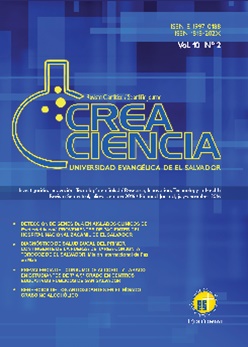Oral health diagnosis of the first joint task force Torogoz. peace operation in Mali
DOI:
https://doi.org/10.5377/creaciencia.v10i2.6032Keywords:
Oral health, Peace Operation, El SalvadorAbstract
Between january and february 2015, an oral health diagnosis was made to the first salvadorean contingent that participated in the Integrated Multidimensional Mission of Stabilization of the United Nations in Mali, called Torogoz. A peace operation approved by the Security Council of the UN in april 2013, because of the coup in this african republic that receives police and military support from 122 countries until now. Following the health protocol that governs the Military Health Command and the Peace Operation Training Center of the Armed Force of El Salvador, the 90 members of Torogoz were examinated to meet the physical and psychological requirements that mission demanded. Specially because this contingent includes only a minority of officers and non comissioned officers with permanent medical attention. In the mean time, the majority of soldiers come from a troop with irregular participation in the army and limited benefits. The result of this quantitative, transversal and prospective investigation about oral health of this provisional Task Force revealed a high prevalence of dental caries despite the majority study subjects recognized the associated risk factors and the benefit of the regular practice of oral health.The research coincides with the World Health Organization about the direct relation between working conditions and quality of life. In that sense, the article offers a reflection about professions and trades of high risk such as militia where stress and health promotion signifcantly affect the performance and public health costs.
CREA CIENCIA Vol. 10 No 2 ISSN1818-202X julio-diciembre 2016, p. 19-27
Downloads
923
Downloads
Published
How to Cite
Issue
Section
License
© Crea Ciencia
Declaration of originality and assignment of rights
The article must be sent with a declaration of originality, responsibility and assignment of rights of copy of the manuscript, scanned and signed by the author or by one of the authors when the authorship is collective (designated author), stating that the text has not previously published in printed or electronic format, which will not be presented to any other media before knowing the decision of the journal Crea Ciencia and that, if accepted for publication, the authors transfer the copyrights in all forms and media known. At the end of six months of the publication, the text can be shared in another magazine citing the first version of the article published in Crea Ciencia and recording its number and volume. If the article is not published, the UEES agrees to return the rights enunciated to their authors.

Crea Ciencia articles are published in open access and licensed under a Creative Commons Attribution-NonCommercial 4.0 International License.

